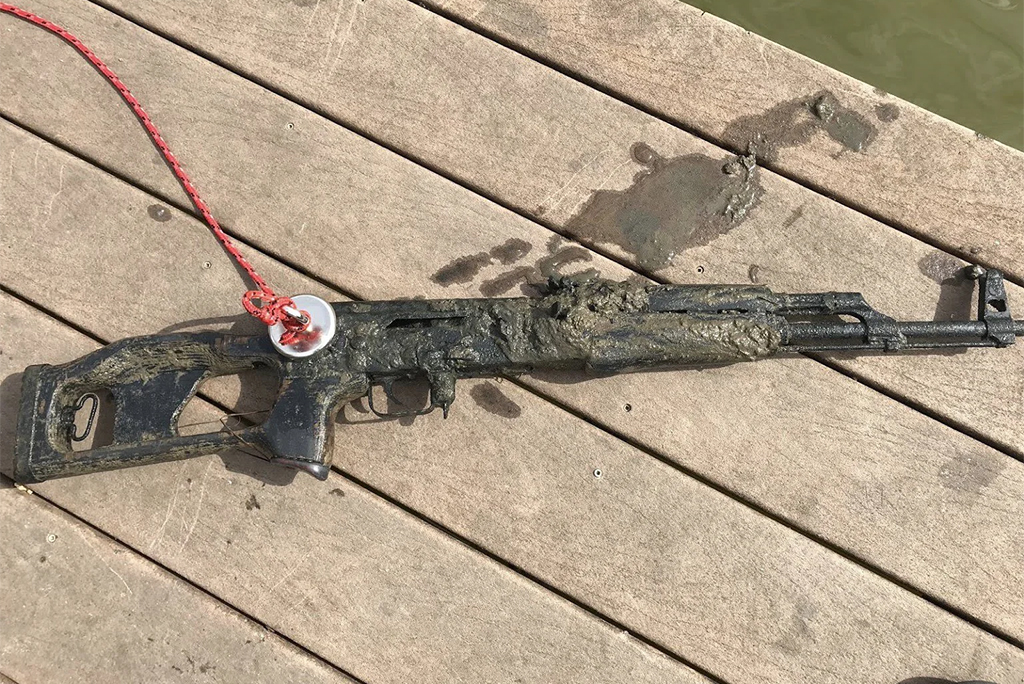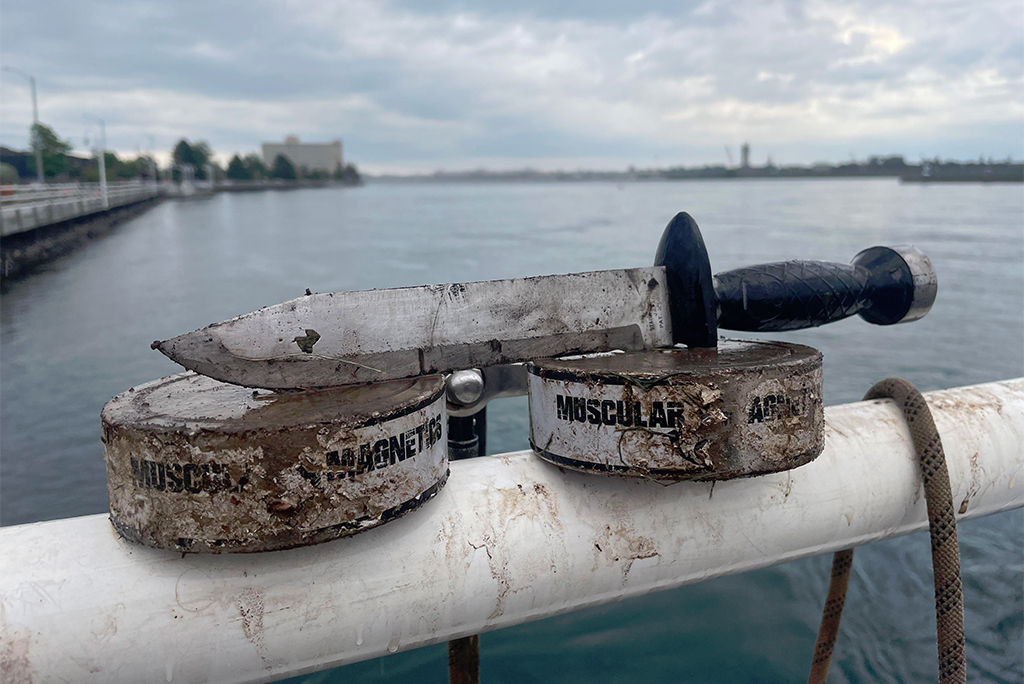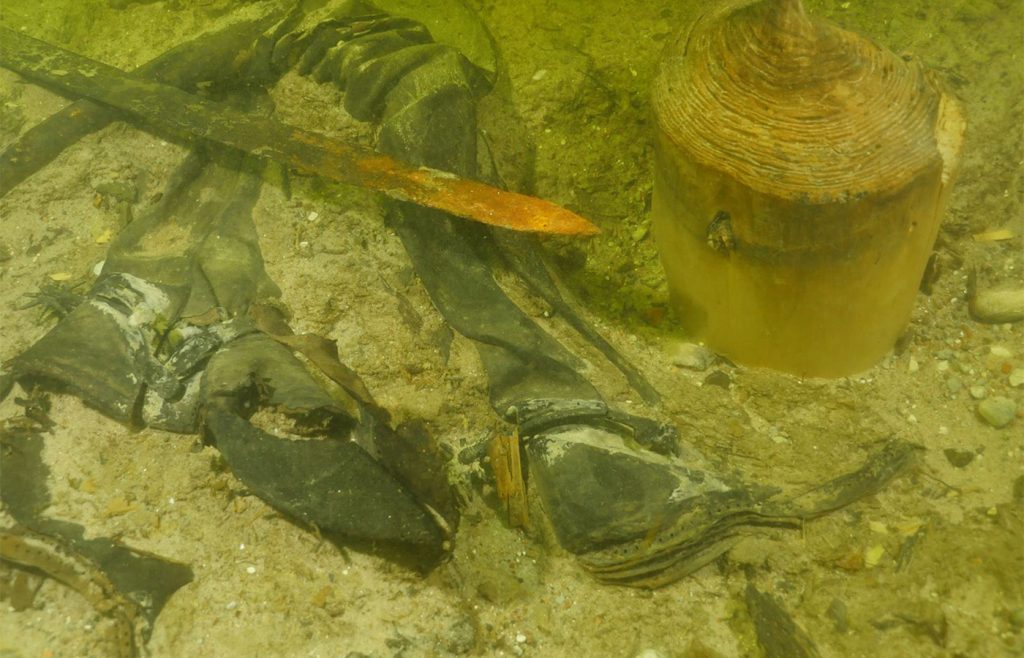Magnet fishing has been gaining popularity in Canada over the years, and for good reason. This hobby involves using a magnet to search for metal objects in bodies of water, such as rivers, lakes, and even canals. It’s an exciting and unique activity that can lead to finding treasures like old coins, jewelry, and even historical artifacts. However, before you dive in and start magnet fishing, it’s important to be aware of the laws and regulations in Canada that govern this activity. Here’s what you need to know.
Table of Contents
Finding Guns Magnet Fishing
As a magnet fisherman in Canada, it’s essential to understand the laws surrounding firearm possession and the proper protocols for handling them when found while fishing. While it can be exciting to come across a gun during a fishing trip, it’s important to remember that firearms are highly regulated in Canada, and unauthorized possession can lead to severe legal consequences.
Under Canadian law, firearms are classified into three main categories: non-restricted, restricted, and prohibited. Non-restricted firearms are the most common type and include rifles and shotguns that are suitable for hunting or sport shooting. Restricted firearms include handguns and certain types of semi-automatic rifles and shotguns that are more dangerous and can only be used at licensed ranges. Prohibited firearms include fully automatic firearms, sawed-off shotguns, and other weapons that are considered too dangerous for public use and are strictly prohibited.
If you happen to find a firearm while magnet fishing, the first thing you should do is leave it where it is and immediately contact the authorities. Handling firearms without the proper license and authorization is illegal and can result in severe penalties. In Canada, unauthorized possession of a firearm can lead to imprisonment for up to 10 years, and penalties can be even more severe if the firearm was used to commit a crime.
It’s important to note that while it’s not illegal to own a firearm in Canada, it’s highly regulated, and strict protocols are in place to ensure that firearms don’t fall into the wrong hands. Anyone who wishes to own a firearm must obtain a license and undergo a background check to ensure that they are not a danger to themselves or others. In addition, firearms must be stored safely and securely, and ammunition must be stored separately.

In summary, finding a gun while magnet fishing can be an exciting experience, but it’s essential to understand the laws surrounding firearm possession in Canada and the proper protocols for handling them. Remember, if you come across a firearm while fishing, do not touch it and immediately contact the authorities. By following these guidelines and being mindful of the regulations surrounding firearms in Canada, you can ensure your safety and the safety of others while enjoying the thrilling hobby of magnet fishing.
Finding Knives Magnet Fishing
As a magnet fisherman in Canada, it’s important to know the regulations surrounding knives and other potentially dangerous objects. While knives are not illegal to possess in Canada, certain types of knives are considered prohibited weapons, and possession of them can lead to severe legal consequences.
In Canada, knives are divided into two categories: non-restricted and prohibited. Non-restricted knives include common pocket knives and hunting knives that are typically used for outdoor activities like camping or fishing. Prohibited knives, on the other hand, include switchblades, butterfly knives, and any other knife that is designed to open automatically or has a blade that can be released by gravity or centrifugal force.
If you come across a knife while magnet fishing, it’s important to determine whether it is a non-restricted or prohibited knife. If it is a non-restricted knife, you may keep it as long as it is for personal use and not for carrying as a weapon. However, if it is a prohibited knife, it must be surrendered to the authorities immediately. Possession of a prohibited knife can result in severe penalties, including imprisonment and fines.
It’s also important to note that the context in which the knife was found can be significant. For example, if the knife was found in the vicinity of a crime scene, it should be reported to the authorities immediately. In addition, if the knife is found to be related to a crime, it can be used as evidence in court.

In summary, while knives are not illegal to possess in Canada, certain types of knives are considered prohibited weapons and are strictly regulated. As a magnet fisherman, it’s essential to know the difference between non-restricted and prohibited knives and to follow the proper protocols for handling them. If you come across a knife while magnet fishing, be sure to determine whether it is a prohibited weapon and contact the authorities immediately if it is. By following these guidelines, you can ensure your safety and avoid legal consequences while enjoying the exciting hobby of magnet fishing in Canada.
Finding Bombs Magnet Fishing
As a magnet fisherman in Canada, it’s important to be aware of the potential danger that comes with finding explosives while out on the water. Explosives are highly regulated in Canada, and it is illegal to possess or transport them without proper authorization from the government.
If you do come across explosives while magnet fishing, it’s important to know how to handle the situation safely. The first and most important step is to not touch or disturb the explosives in any way. Explosives can be highly unpredictable and can detonate with very little warning or provocation. Instead, you should immediately call the police or other authorities and report the location and nature of the explosive.
When you call the authorities, be sure to provide as much information as possible. This can include the location of the explosives, any identifying features or markings, and any other relevant details that may help the authorities to assess the situation and respond appropriately. It’s also important to stay at a safe distance from the explosives and to ensure that other people in the area are aware of the potential danger.
In general, it’s important to exercise caution and good judgment when magnet fishing. While it can be an exciting and rewarding hobby, it also comes with certain risks and responsibilities. By following the proper safety protocols and being mindful of the regulations and laws governing magnet fishing in Canada, you can enjoy this exciting activity while also keeping yourself and others safe.

In summary, if you come across explosives while magnet fishing, it’s important to know how to handle the situation safely. Do not touch or disturb the explosives, and immediately call the authorities to report the location and nature of the explosive. By following these guidelines, you can help to ensure your safety and the safety of others while enjoying the exciting hobby of magnet fishing in Canada.
Metal Detecting Law Similarities
Metal detecting and magnet fishing share similarities in terms of the laws and regulations that govern both activities. As both activities involve searching for lost items, it’s important to understand the similarities in the laws that apply to both.
One of the most significant similarities between the two activities is in the laws surrounding the discovery of historical artifacts. Both metal detecting and magnet fishing are subject to the same laws when it comes to searching for artifacts that are over 100 years old. These artifacts are considered a part of Canada’s heritage and must be reported to the authorities. If you discover an artifact that is over 100 years old while metal detecting or magnet fishing, you must report it to the appropriate authorities. This is because these artifacts are protected under the Heritage Conservation Act.
In addition, both metal detecting and magnet fishing are subject to the same laws when it comes to searching on private property. If you want to search on private property, you must have the owner’s permission to do so. If you are found searching on private property without permission, you may be charged with trespassing.
It’s also important to note that both activities are subject to provincial and municipal laws, as well as federal laws. It’s important to research the laws in your specific area before engaging in either activity.

While there are similarities between the laws that govern metal detecting and magnet fishing, it’s important to understand that there are also differences. For example, metal detecting is generally more regulated than magnet fishing, as it can potentially disturb the ground and cause damage to historical artifacts. Therefore, it’s important to be aware of the laws and regulations that apply to both activities, and to always act in accordance with them.
Wreck and Salvage Laws
In Canada, the law on wreck and salvage is governed by the Canadian Maritime Law, which applies to all Canadian waters, including lakes and rivers. The law is in place to protect the integrity of the marine environment, as well as to ensure the safety of individuals who may be involved in water activities such as boating, fishing, and even magnet fishing.
Under the Canadian Maritime Law, any vessel or object that is sunk, stranded, or abandoned is considered a “wreck”. When a wreck is found, it becomes the property of the Crown, and it is illegal for anyone to tamper with or remove any parts of the wreck without permission from the authorities. This includes magnet fishing, as any objects found in a wreck that are removed without permission can be considered theft.
In addition to wrecks, salvage laws also apply to objects that are lost or abandoned in the water. If you come across any items that have been lost or abandoned, it’s important that you report them to the authorities. You may be entitled to a salvage award for returning the lost or abandoned item to its rightful owner, but only if you follow the proper procedures and obtain permission from the authorities.
It’s important to note that even if an object appears to have no owner or value, it is still subject to the same wreck and salvage laws. Unauthorized removal of any items from the water can result in penalties and fines, so it’s always best to report any findings to the authorities and let them handle the situation.
Magnet fishing enthusiasts should be aware that, while wrecks and lost objects may seem like potential treasure troves, they are also sensitive ecological habitats. It’s important to be mindful of the impact that magnet fishing may have on the environment, and to adhere to any restrictions or regulations in place to protect the marine ecosystem.

Ultimately, it is essential to understand that the laws around wreck and salvage in Canada are in place to protect the marine environment and preserve Canada’s cultural heritage. It’s important to follow the proper procedures and obtain permission from the authorities before removing any objects from the water to avoid any legal repercussions.
Check Province Regulations
Before you start magnet fishing in Canada, it’s essential to research and understand the local laws and regulations that govern your area. Each province may have different rules and guidelines, so it’s crucial to do your due diligence to avoid running afoul of the law.
For example, in Ontario, magnet fishing is legal as long as you obtain permission from the landowner if you plan on magnet fishing on private property. In contrast, in British Columbia, magnet fishing is legal in public waterways and beaches as long as you are not disturbing wildlife or harming the environment. However, in Quebec, magnet fishing is not permitted in public waterways, and you must obtain permission from the landowner if you plan to magnet fish on private property.
Additionally, some provinces may have restrictions on where you can use a magnet, such as prohibiting magnet fishing in certain parks or protected areas. For instance, in Alberta, it’s illegal to use a magnet in any provincial park or protected area, while in Saskatchewan, you may use a magnet in a provincial park, but you must obtain permission from the park authorities beforehand.
It’s also essential to note that while magnet fishing is generally legal in Canada, some areas may have bylaws or regulations that prohibit the activity altogether. So before you start, it’s essential to check with local authorities to ensure that you’re not breaking any rules or regulations.
In conclusion, it’s crucial to do your research and understand the local laws and regulations before you start magnet fishing in Canada. This will ensure that you’re staying within the legal limits and avoiding any potential legal repercussions.
Check City / Local Ordinances
If you’re planning on magnet fishing in Canada, it’s important to understand that different cities and municipalities may have their own unique ordinances or by-laws when it comes to this activity. This is why it’s important to check local laws in addition to provincial regulations. Doing so can help ensure that you’re not breaking any rules or regulations that may apply to your specific location.
For example, some cities may require you to obtain a permit before you can engage in magnet fishing. Others may have restrictions on where you can magnet fish or what type of equipment you can use. By taking the time to research local ordinances, you can avoid any potential legal trouble and ensure that you’re following the rules.
One way to check local ordinances is to visit your city or municipality’s website. There, you may be able to find information on any specific laws or regulations related to magnet fishing. You could also contact your local government office or law enforcement agency to ask about any local rules that may apply.
Remember that laws and regulations can change over time, so it’s a good idea to regularly check for any updates or changes to local ordinances. This can help you stay up-to-date and ensure that you’re always in compliance with the law.
In summary, it’s important to not only be aware of provincial regulations when it comes to magnet fishing in Canada, but also to research any local ordinances or by-laws that may apply to your specific location. Doing so can help ensure that you’re following the rules and enjoying this activity safely and responsibly.
In conclusion, magnet fishing is a growing trend in Canada, but it is important to remember that it is not without its regulations and responsibilities. While the laws surrounding magnet fishing in Canada are not as strict as in other countries, it is still essential to abide by them to ensure your safety and the safety of others.
It’s important to note that while magnet fishing can be a fun and unique hobby, it can also be a dangerous one if done improperly. Therefore, if you are a beginner, it is recommended that you go with an experienced magnet fisherman or take a course to learn the basics.
As we have seen, laws and regulations governing magnet fishing can vary by province and city, so it’s crucial to research and understand the local laws before engaging in this activity. In addition, it’s important to respect the environment and dispose of any waste or debris properly.
Lastly, if you come across any potentially dangerous items while magnet fishing, such as guns, explosives, or other hazardous materials, it is essential to contact the authorities immediately and let them handle it. It is better to err on the side of caution and avoid putting yourself and others at risk.
Overall, by following the laws and regulations, respecting the environment, and taking proper precautions, magnet fishing can be an enjoyable and rewarding experience for all Canadians.

